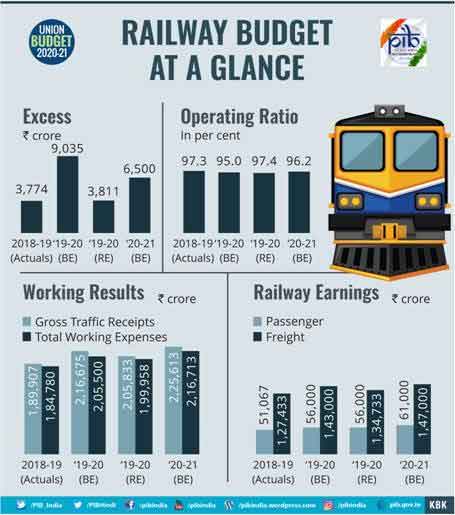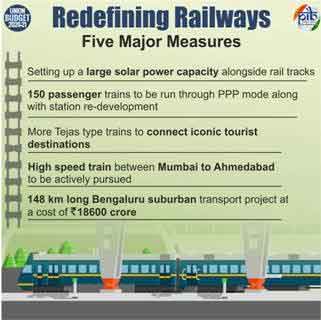Railway Budget 2020: More Tejas-type trains, bullet train by 2023, Kisan rail and other key facts
Here are the major highlights of FM Nirmala Sitharaman's speech and announcements regarding the Indian Railways.
Trending Photos
)
NEW DELHI: Union Finance Minister Nirmala Sitharaman on Saturday (February 1) announced several measures aimed at improving the railway infrastructure while delivering her second General Budget in Parliament.
Enlisting the achievements of the Indian Railways within 100 days of assumption of the current government, the Finance Minister proposed the following five measures for optimisation of costs: Setting up a large solar power capacity alongside the rail tracks, on the land owned by the railways; Four station re-development projects and operation of 150 passenger trains would be done through PPP model; More Tejas type trains will connect iconic tourist destinations; High-speed train between Mumbai to Ahmedabad would be actively pursued; 148-km long Bengaluru Suburban transport project at a cost of Rs 18600 crore, would have fares on metro model.
Central Government would provide 20% of equity and facilitate external assistance up to 60% of the project cost, the FM said. With an aim to build a seamless national cold supply chain for ‘perishables’, the Finance Minister also proposed that the Indian Railways will set up a “Krishi Rail”- through PPP arrangements.
There will be refrigerated coaches in the express and Freight trains as well she said.

Sitharaman on Saturday said that the work on Prime Minister Narendra Modi`s ambitious 508-km Ahmedabad-Mumbai High-Speed train project will be actively pursued.
Presenting the Union Budget 2020-21 in the Lok Sabha, Sitharaman said, "After coming to power in May within 100 days railways has eliminated unmanned level crossings, commissioned WiFi at 550 stations, and aims to achieve electrification of 27,000 kms of tracks for optimisation of cost."
She said that railways have a small operating surplus. "About Indian Railways, there are five measures that I wish to highlight. Setting up a large solar power capacity alongside the rail tracks on the land owned by railways. A proposal is under consideration," she said.
The national transporter also has planned to tap solar power to lower its expenses. The railways plan to become self-sufficient in solar power by 2030.

"Four station redevelopment projects and operation of 150 passenger trains would be done through the PPP model. The process of inviting private participation is underway," the Minister said. The railways have already invited private companies to bid for the project.
Till date, private players like Tata Realty and Infrastructure Ltd, Bombardier, Hyundai Rotem Company, CAF India, Hitachi India and South Asia, Essel Group, Adani Ports and SEZ, Talgo, Siemens Ltd, Alstom Transport and others have shown interest in the railways' project.
"More Tejas-type trains to connect iconic tourist destinations. High-speed train between Mumbai-Ahmedabad would be actively pursued," she said. The railways has already provided two Tejas trains to its catering arm Indian Rail Catering and Tourism Corporation (IRCTC) to operate the train on two routes.
The IRCTC is currently running two Tejas Express trains between New Delhi-Lucknow and Mumbai-Ahmedabad. The first service was started in October last year while the second service of the Tejas Express was started in January this year.
The 508-km Ahmedabad-Mumbai High-Speed Rail project, also known as the Bullet Train project, is supposed to be completed by 2023.
PM Modi and his Japanese counterpart Shinzo Abe on September 14, 2017, laid the foundation stone of the ambitious Rs 1.08 lakh crore ($17 billion) project. Japan International Cooperation Agency (JICA) and the Union Railway Ministry have inked a memorandum of understanding (MoU) for the 508-km corridor with Japan to partially fund the project.
he Finance Minister further said that the 148-km Bengaluru suburban transport project at a cost of Rs 18,600 crore would be based on a metro model.







)
)
)
)
)
)
)
)
)
)
